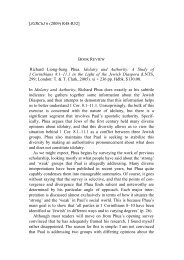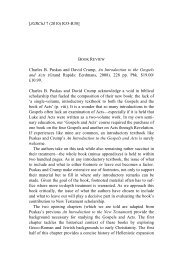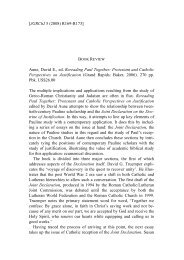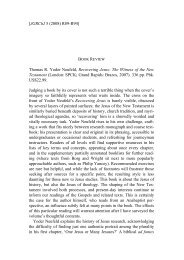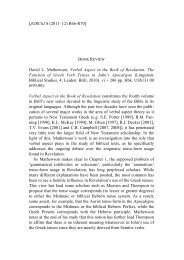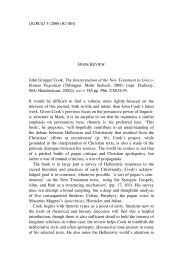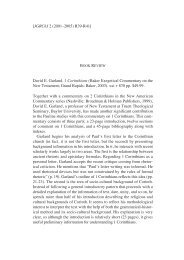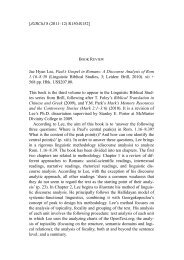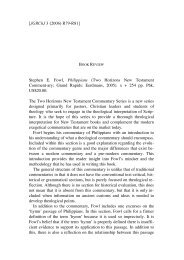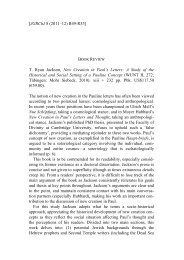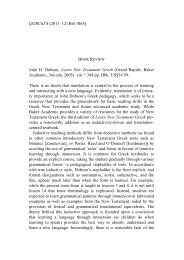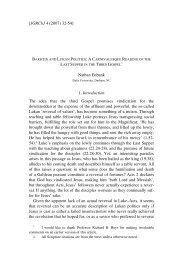The Politics of Ephesians and the Empire - Journal of Greco-Roman ...
The Politics of Ephesians and the Empire - Journal of Greco-Roman ...
The Politics of Ephesians and the Empire - Journal of Greco-Roman ...
Create successful ePaper yourself
Turn your PDF publications into a flip-book with our unique Google optimized e-Paper software.
Gupta & Long <strong>Politics</strong> <strong>of</strong> <strong>Ephesians</strong> <strong>and</strong> <strong>the</strong> <strong>Empire</strong> 135<br />
<strong>the</strong> same kind <strong>of</strong> idea that <strong>the</strong> colony <strong>of</strong> heaven could be integrated into<br />
<strong>the</strong> earthly society. 90 It is for this reason that we have labeled <strong>the</strong> HC<br />
<strong>of</strong> <strong>Ephesians</strong> as a <strong>the</strong>o-politically centric, transformative, <strong>and</strong> missional<br />
conformity. <strong>The</strong> choice to support this household system was probably<br />
practical to some degree. But that should not necessarily put it at odds<br />
with <strong>the</strong> message <strong>of</strong> <strong>the</strong> Paul <strong>of</strong> <strong>the</strong> undisputed letters. Ra<strong>the</strong>r, one can<br />
accept that a decision was made to transform society within <strong>the</strong> existing<br />
structures to a certain degree: ‘Christianity recognised that it had perforce<br />
to live <strong>and</strong> witness within [its inevitably flawed <strong>and</strong> imperfect] society by<br />
combining <strong>the</strong> proven wisdom <strong>of</strong> that society with commitment to its own<br />
Lord <strong>and</strong> <strong>the</strong> transforming power <strong>of</strong> <strong>the</strong> love which he had embodied’. 91<br />
Conclusions<br />
In <strong>the</strong> course <strong>of</strong> this article, we have engaged passages in <strong>Ephesians</strong> that<br />
have been problematic ins<strong>of</strong>ar as <strong>the</strong>y have been interpreted to support an<br />
accommodationist reading <strong>of</strong> <strong>the</strong> letter. Specifically, we have investigated<br />
those passages concerned with rulers <strong>and</strong> authorities (1.15-23; 2.1-3;<br />
3.10; 6.10-13) <strong>and</strong> <strong>the</strong> Household Code (5.15–6.9). Certainly o<strong>the</strong>r texts<br />
could have been included in our analysis. Our conclusion is that far from<br />
supporting <strong>the</strong> status quo, <strong>Ephesians</strong> <strong>of</strong>ten confronts <strong>and</strong> trumps imperial<br />
prerogatives <strong>and</strong> titles while also subverting conventional wisdom<br />
about household relations. This is achieved by featuring as <strong>the</strong> head <strong>of</strong><br />
<strong>the</strong> church body a political leader <strong>and</strong> ruler, Jesus Messiah Lord, who<br />
himself modeled sacrificial love (1.4-8; 3.15-19; 5.2, 25, 29) <strong>and</strong> expects<br />
such from his followers (4.20-24; 4.32–5.2; 5.25-29).<br />
We have considered specific philological data from <strong>the</strong> first centuries<br />
that could situate <strong>Ephesians</strong> within <strong>the</strong> socio-religio-political milieu<br />
routine act or object with pr<strong>of</strong>ound religious significance.’<br />
90. Looking at <strong>the</strong> rationale <strong>and</strong> ideology <strong>of</strong> asceticism, MacDonald argues, with<br />
respect to <strong>Ephesians</strong>, that ‘<strong>The</strong> heavenly body is one that might be secretly integrated<br />
within household quarters <strong>and</strong>, hence, carefully hidden from a householder who<br />
would resist such an invasion’; see M.Y. MacDonald, ‘Citizens <strong>of</strong> Heaven <strong>and</strong> Earth:<br />
Asceticism <strong>and</strong> Social Integration in Colossians <strong>and</strong> <strong>Ephesians</strong>’, in L.E. Vaage et al.<br />
(eds.), Asceticism <strong>and</strong> <strong>the</strong> New Testament (London: Routledge, 1999), pp. 269-354<br />
(291).<br />
91. Dunn, ‘Household Rules’, p. 61. Similarly, see M. Volf, ‘S<strong>of</strong>t Difference:<br />
<strong>The</strong>ological Reflections on <strong>the</strong> Relation between Church <strong>and</strong> Culture in 1 Peter’, Ex<br />
Auditu 10 (1994), pp. 15-30 (18): ‘Christians are insiders [<strong>of</strong> <strong>the</strong>ir social home] who<br />
have diverted from <strong>the</strong>ir culture by being born again.’



